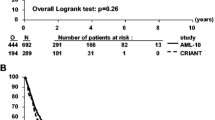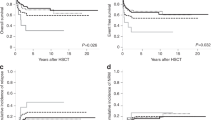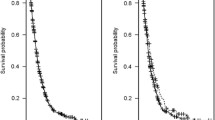Abstract
This study was performed to identify whether cytogenetics, International Prognostic Scoring System (IPSS), or World Health Organization Classification-Based Prognostic Scoring System are predictive of the efficacy of azacitidine in patients with myelodysplastic syndrome (MDS). We retrospectively reviewed the clinical records of 113 patients with MDS treated with azacitidine. The “response alternating disease natural history,” “cytogenetic response,” and “hematologic improvement” were assessed by serial bone marrow biopsy, cytogenetic study, and hemogram analyses. The complete and partial remission rates were 17.6% and 3.9% in 51 evaluable patients. There were no significant differences in response rate in the different cytogenetic/IPSS/WPSS groups. The overall hematologic response (HR) rate was 49.6%, and the HR rate was significantly greater in patients classed as “very high” risk according to the WPSS compared with other patient groups. The 1-year overall survival (OS) rate was higher among patients with HR compared with those without HR (80.9% vs 63.3%, p = 0.046), and the 1-year OS rate among patients classed as being at high risk by each criteria was similar to that of patients classed as being at low risk. The hazard ratio of death among patients with HR compared with those without HR was 0.17 (95% CI 0.04–0.69) for high + very high risk group based on WPSS. Patients in the WPSS high-risk group had an increased HR rate compared with other patient groups, and the achievement of HR was associated with a significant increase in OS. Azacitidine showed similar efficacy in all patient groups, even in patients with poor cytogenetics and in high-risk groups.

Similar content being viewed by others
References
Silverman LR, Demakos EP, Peterson BL et al (2002) Randomized controlled trial of azacitidine in patients with the myelodysplastic syndrome: a study of the cancer and leukemia group B. J Clin Oncol 20:2429–2440
Silverman LR, McKenzie DR, Peterson BL et al (2006) Further analysis of trials with azacitidine in patients with myelodysplastic syndrome: studies 8421, 8921, and 9221 by the Cancer and Leukemia Group B. J Clin Oncol 24:3895–3903
Plimack ER, Kantarjian HM, Issa JP (2007) Decitabine and its role in the treatment of hematopoietic malignancies. Leuk Lymphoma 48:1472–1481
Kantarjian HM, O'Brien S, Huang X et al (2007) Survival advantage with decitabine versus intensive chemotherapy in patients with higher risk myelodysplastic syndrome: comparison with historical experience. Cancer 109:1133–1137
Leone G, Voso MT, Teofili L, Lubbert M (2003) Inhibitors of DNA methylation in the treatment of hematological malignancies and MDS. Clin Immunol 109:89–102
Oki Y, Issa JP (2007) Treatment options in advanced myelodysplastic syndrome, with emphasis on epigenetic therapy. Int J Hematol 86:306–314
Lubbert M (2003) Gene silencing of the p15/INK4B cell-cycle inhibitor by hypermethylation: an early or later epigenetic alteration in myelodysplastic syndromes? Leukemia 17:1762–1764
Raj K, John A, Ho A et al (2007) CDKN2B methylation status and isolated chromosome 7 abnormalities predict responses to treatment with 5-azacytidine. Leukemia 21:1937–1944
Daskalakis M, Nguyen TT, Nguyen C et al (2002) Demethylation of a hypermethylated P15/INK4B gene in patients with myelodysplastic syndrome by 5-Aza-2′-deoxycytidine (decitabine) treatment. Blood 100:2957–2964
Gryn J, Zeigler ZR, Shadduck RK et al (2002) Treatment of myelodysplastic syndromes with 5-azacytidine. Leuk Res 26:893–897
van den Bosch J, Lubbert M, Verhoef G, Wijermans PW (2004) The effects of 5-aza-2′-deoxycytidine (Decitabine) on the platelet count in patients with intermediate and high-risk myelodysplastic syndromes. Leuk Res 28:785–790
Wijermans PW, Lubbert M, Verhoef G, Klimek V, Bosly A (2005) An epigenetic approach to the treatment of advanced MDS; the experience with the DNA demethylating agent 5-aza-2′-deoxycytidine (decitabine) in 177 patients. Ann Hematol 84(Suppl 1):9–17
Lubbert M, Wijermans P, Kunzmann R et al (2001) Cytogenetic responses in high-risk myelodysplastic syndrome following low-dose treatment with the DNA methylation inhibitor 5-aza-2′-deoxycytidine. Br J Haematol 114:349–357
Greenberg P, Cox C, LeBeau MM et al (1997) International scoring system for evaluating prognosis in myelodysplastic syndromes. Blood 89:2079–2088
Malcovati L, Germing U, Kuendgen A et al (2007) Time-dependent prognostic scoring system for predicting survival and leukemic evolution in myelodysplastic syndromes. J Clin Oncol 25:3503–3510
Cheson BD, Greenberg PL, Bennett JM et al (2006) Clinical application and proposal for modification of the International Working Group (IWG) response criteria in myelodysplasia. Blood 108:419–425
Acknowledgments
We extend a special thanks to all members of the Korean AML/MDS Working Party. We particularly thank Byoung Kook Kim, Seong-Jun Choi, Hun-Mo Ryoo, and Mun Ju Jang for participation in this study.
Disclosures about potential conflict of interest
There is no relevant conflict of interest to declare for this study.
Author information
Authors and Affiliations
Consortia
Corresponding authors
Additional information
Je-Hwan Lee and Soo-Mee Bang contributed equally to this study as corresponding authors.
Author’s contribution
Soo-Mee Bang made substantial contributions to study concept and design.All authors and those included in the acknowledgment helped in the acquisition of data. Analysis and interpretation of data were done by Dae-Young Kim, Soo-Mee Bang, and Je-Hwan Lee.Drafting the article or critically revising for important intellectual content was made by Dae-Young Kim, Soo-Mee Bang, and Je-Hwan Lee.Final approval of the version to be published came from Soo-Mee Bang and Je-Hwan Lee.
Rights and permissions
About this article
Cite this article
Kim, DY., Lee, JH., Lee, JH. et al. Comparison of various criteria in predicting treatment response and prognosis of patients with myelodysplastic syndrome treated with azacitidine. Ann Hematol 89, 15–23 (2010). https://doi.org/10.1007/s00277-009-0771-1
Received:
Accepted:
Published:
Issue Date:
DOI: https://doi.org/10.1007/s00277-009-0771-1




